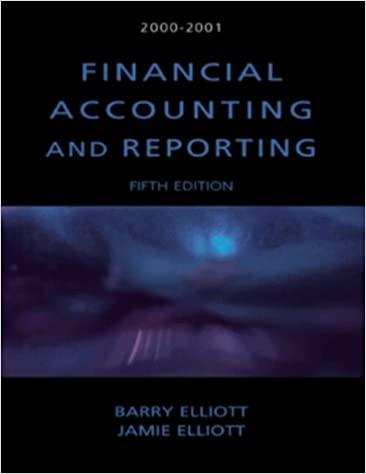Question
Andy and Bertha each has owned 50% of the stock of Wallet Corporation for many years. Andys stock basis is $800 (FMV $1,000) and Berthas
Andy and Bertha each has owned 50% of the stock of Wallet Corporation for many years. Andys stock basis is $800 (FMV $1,000) and Berthas stock basis is $1,200 (FMV $1,000). Wallet is engaged in two lines of business (and has been so engaged for the last five years, unless the facts specify otherwise): the manufacture and sale of electronic equipment (Electro division) and the manufacture and sale of air conditioners (Airco division). The assets of each division have a FMV of $1,000 and an adjusted basis of $500, no liabilities exist, and Wallet has E&P of $1,000. Assume that 100% of the stock of a corporation is worth the net value of its assets, and ignore calculation of tax owed by Wallet. Except where otherwise indicated, assume that the transactions are motivated by good corporate business purposes and that no shareholder plans to dispose of any stock received. What are the tax consequences to the parties in each of the following transactions?
a. Wallet transfers all of the Electro assets to new Purse Corporation in exchange for all of Purses stock and transfers all of the Airco assets to new Messenger Corporation in exchange for all of Messengers stock. Immediately thereafter, Wallet liquidates and distributes the Purse and the Messenger stock ratably to Andy and Bertha.
b. Assume in a. that the business purpose was to protect Airco assets from Electro creditors?
c. What if Wallet distributed the Purse stock to Andy and the Messenger stock to Bertha? What if Purse sold its Electro business assets shortly after the distribution?
d. What if (in a.) the value of the Electro business was $1,800 and the value of the Airco business was $200 and Wallet had NOL carryovers of $100?
e. Wallet transfers the Electro assets to new Purse in exchange for all of Purses stock. Immediately thereafter, Wallet distributes the Purse stock to Andy in exchange for all of Andys stock?
f. Would your answer to e. above change if Andy had sold his stock to Curtis for cash just after the distribution of Purse to Andy? What if Andy had sold his stock to Curtis just before the distribution of Purse to Andy?
g. What if the sale to Curtis in f. occurred two and a half years before the distribution?
Step by Step Solution
There are 3 Steps involved in it
Step: 1

Get Instant Access to Expert-Tailored Solutions
See step-by-step solutions with expert insights and AI powered tools for academic success
Step: 2

Step: 3

Ace Your Homework with AI
Get the answers you need in no time with our AI-driven, step-by-step assistance
Get Started


